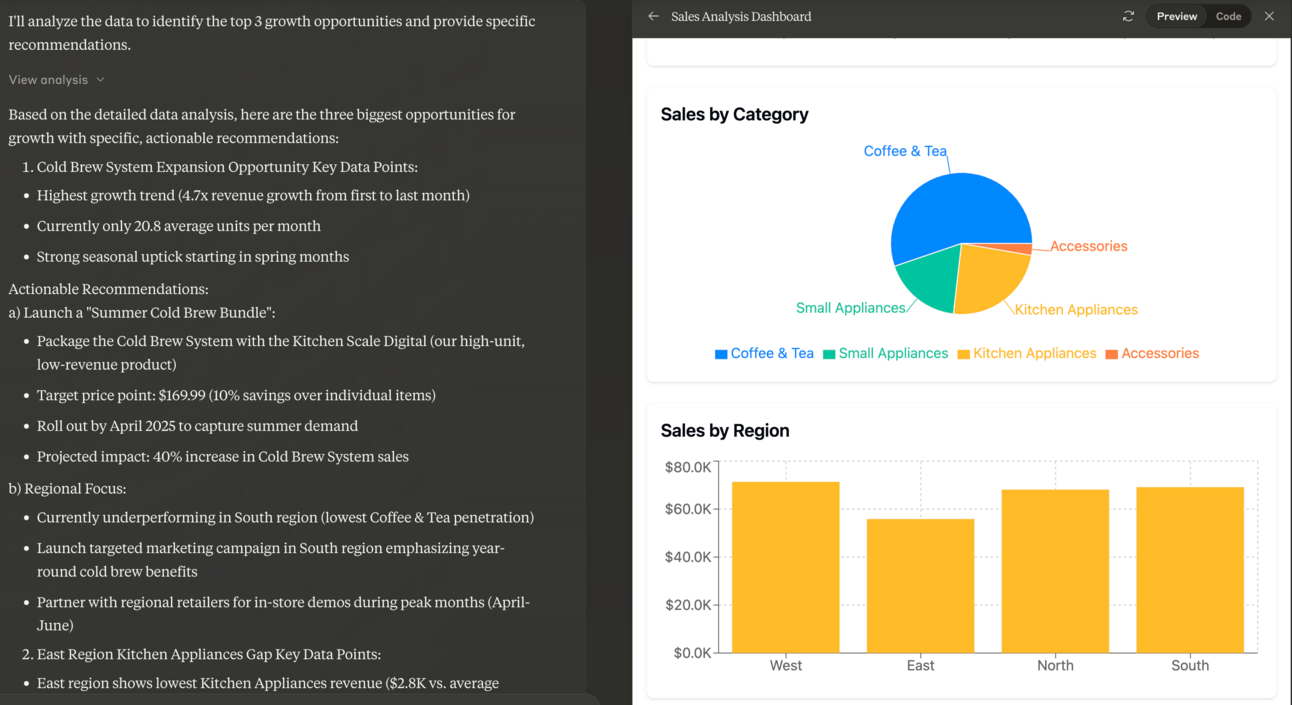Reading Time: 4 minutes
Hello AI Enthusiast,
Buried in sales spreadsheets? Today, we'll show you how Claude can transform your raw data into clear, actionable insights, without any code.
The Problem
We've been there: staring at rows of sales data, knowing there are valuable insights hidden within but struggling to surface them. Traditionally, this meant either complex coding or hours in spreadsheet tools. Let's fix that by using Claude and its Artifacts feature.
How do you currently analyze your sales data?
Step 1: Prepare Your Data
In this step, you can export your sales data from your CRM and use it directly. If your data contains any confidential information and this poses a challenge, remember that you can always anonymize the dataset. For example, if you prefer not to share the company name, you can replace it with something like ‘FakeCompany123’ in your dataset.
In our case, we’ve created a fake dataset representing the sales data of a company that sells kitchen accessories to work with.

Sample sales dataset
Upload your sales spreadsheet to Claude and use this simple prompt:
I've uploaded our sales data. Please analyze the monthly trends, top products, and customer segments.Only with this very simple prompt on Claude, you will already get an overview on the monthly revenue trend, top products by revenue and sales by category.

Claude's initial analysis with monthly trends and category breakdowns
💡 Pro tip: Want specific formats? Just add something that sounds like this: "Present the monthly trends as a line chart and top products as a bar chart."
Step 2: Get Strategic Insights
Now the fun part - let's make this data work for you. Ask Claude:
Based on these visualizations, what are our three biggest opportunities for growth? Please provide specific, actionable recommendations.
Dashboard with insights
The screenshot shows a sales analysis dashboard and actionable recommendations. The dashboard includes visual insights, such as a pie chart showing sales by product category and a bar chart breaking down sales by region.
Alongside these visuals, Claude identified key growth opportunities, including product expansion and regional marketing strategies, providing a comprehensive data-driven approach to decision-making.
Step 3: Create Your Report
Well, we have all these cool insights, why not turn them into a shareable report with just one prompt?
Create a one-page executive summary of our sales analysis. Include the key findings, visualizations, and recommendations. Format it for easy scanning by busy executives.
Sales Analysis executive summary
Once your report is ready, you can publish your Artifacts and share the link with your team or discuss it directly on Claude. You could even try creating an interactive dashboard.
This is just one example of how AI can save hours of manual data work. Chances are your team has access to these tools but doesn't realize their power, defaulting to standard methods. Through our Corporate Training program, we teach teams to identify high-impact automation opportunities and implement AI solutions that save hours per week.
Your Turn
Now challenge yourself to dig deeper by picking one key question your business needs to answer. It could be:
What drives customer retention in your top-performing region?
Which products tend to be purchased together, and why?
How do seasonal trends affect different customer segments?
Pick your most pressing question and use Claude to get actionable insights. The goal isn't just to analyze data, but to uncover insights that can drive real business decisions.
❗Disclaimer: While Claude's analysis is powerful, always combine it with your business expertise for best results.
Want to get even more practical? Explore hands-on AI learning with AI Academy:
Generative AI Project Bootcamp: Create AI prototypes to solve real business problems.
Corporate Training: Tailored AI training for your team.
Practical Introduction to ChatGPT: Free course on effectively using ChatGPT.
We'll be back with more AI tips soon!
